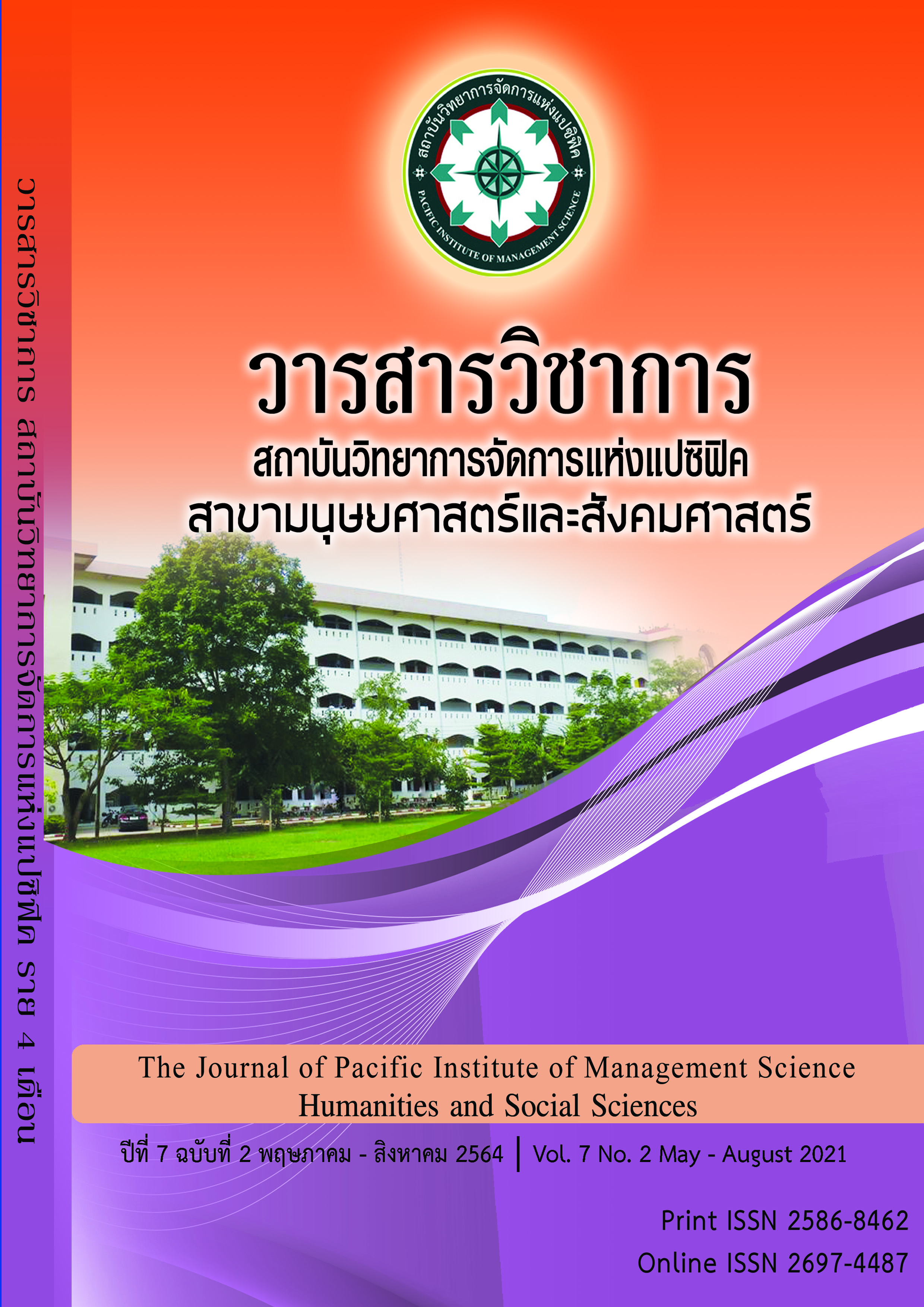Strategy for Cooperation in Crime Prevention Cooperation Responsible area, Metropolitan Police Bureau
Keywords:
Crime Prevention, Cooperation Development, StrategyAbstract
This research has an objective for (1) Study the opinions of the factors causing crime problems affecting the development of crime prevention cooperation. in the metropolitan police headquarters (2) to study the level of opinions about crime prevention factors that affect the strategy of crime prevention cooperation development. in the metropolitan police headquarters (3) Study the opinions of management in solving crime problems That affects the development strategy for crime prevention cooperation in the metropolitan police headquarters (4) Study the opinions of management in solving crime problems That affects the development strategy for crime prevention cooperation in the metropolitan police headquarters. The researcher used quantitative research methods. By collecting data from questionnaires Get a target group of 400 people The statistics used for data analysis were percentage, mean, standard deviation and stepwise multiple regression analysis. of 400 people Statistics used in data analysis were percentage, mean, standard deviation and stepwise multiple regression analysis. The results of the research showed that
(1) Factors causing crime problems as a whole are at the highest level (M = 4.23, S.D. = 0.40).
(2) Crime prevention factors The overall picture is at the high level (M = 4.11, S.D. = 0.48).
(3) The level of opinions of management in solving crime problems That affects the development strategy for crime prevention cooperation In the metropolitan police headquarters In overall, it was at the highest level (M = 4.22, S.D. = 0.42). and
(4) Opinion levels on cooperation in crime prevention development cooperation strategies in the metropolitan police headquarters The overall picture is at the high level (M = 4.39, S.D. = 0.77).
References
กฤษณพงศ์ พูตระกูล. (2560). การป้องกันอาชญากรรมในทศวรรษหน้ากับการพัฒนาระบบงานตำรวจ. (พิมพ์ครั้งที่ 1). กรุงเทพ ฯ: ซีเอ็ดยูเคชั่น.
กรรณิกา ชมดี. (2524). การมีส่วนร่วมของประชาชนที่มีผลต่อการพัฒนาเศรษฐกิจ: ศึกษาเฉพาะกรณีโครงการสารภีตําบลท่าชาง อําเภอวารินชําราบ จังหวัด อุบลราชธานี. (วิทยานิพนธ์สังคมสงเคราะหศาสตรมหาบัณฑิต), มหาวิทยาลัยธรรมศาสตร์.
เจิมศักดิ์ ปิ่นทอง. (2526). การบริหารงานพัฒนาชนบท. กรุงเทพ ฯ: โอเดียนสโตร์. น. 272-273
ชยพัทธ์ วงศ์ธนวีร์. (2555). ความพึงพอใจในการปฏิบัติงานของเจ้าหน้าที่ตำรวจ: กรณีศึกษาสถานีตำรวจนครบาลบางนา. กรุงเทพ ฯ: มหาวิทยาลัยเกษมบัณฑิต
ชาคริต ถิ่นจันทร์. (2550). ความร่วมมือของประชาชนในการป้องกันอาชญากรรมในเขตท้องที่สถานีตำรวจภูธรอำเภอเมืองเชียงใหม่. เชียงใหม่ : บัณฑิตวิทยาลัย มหาวิทยาลัยเชียงใหม่.
ชูสวัสดิ์ จันทรโรจนกิจ. (2550). การมีส่วนร่วมของประชาชนในการป้องกันปัญหาอาชญากรรมในพื้นที่เขตรับผิดชอบสถานีตำรวจนครบาลห้วยขวาง. กรุงเทพ ฯ: สถาบันบัณฑิตพัฒนบริหารศาสตร์.
นฎกร คำประสิทธิ์. (2557). การมีส่วนร่วมของประชาชนในการป้องกันอาชญากรรม: กรณีศึกษาตำบลเขาคันทรง อำเภอศรีราชา จังหวัดชลุบรี. สืบค้นจากhttps://www.rsu.ac.th/cja/IS/07-NADAKRON_KHAMPRASIT-2557.pdf
นิรันดร์ จงวุฒิเวศย์. (2527). การมีส่วนร่วมของประชาชนในการพัฒนา. กรุงเทพ ฯ: มหาวิทยาลัยมหิดล.
พิเชษฐ์ ชัยมาลา. (2554). การจัดการภาครัฐแนวใหม่ในการป้องกันอาชญากรรม ในเขตเทศบาลเมืองหัวหิน ของสถานีตำรวจภูธรหัวหิน อำเภอหัวหิน จังหวัดประจวบคีรีขันธ์. มหาวิทยาลัยราชภัฏเพชรบุรี: เพชรบุรี.
พีรวุฒิ คำใจ. (2551). ปัญหาและอุปสรรคของเจ้าหน้าที่ตำรวจในการป้องกันและปราบปรามอาชญากรรมในเขตอำเภอเมืองเชียงใหม่ จังหวัดเชียงใหม่. เชียงใหม่: บัณฑิตวิทยาลัย มหาวิทยาลัยเชียงใหม่.
ไพโรจน์ โกษา. (2557). การมีส่วนร่วมของประชาชนในการป้องกันอาชญากรรมเชิงในพื้นที่รับผิดชอบของสถานีตำรวจภูธรบางระกำ จังหวัดพิษณุโลก. มหาวิทยาลัยราชภัฏพิบูลสงคราม: พิษณุโลก.
สุกานดา จันทวารีย์. (2559). การพัฒนากลยุทธ์การสร้างภูมิคุ้มกันและป้องกันยาเสพติดในจังหวัดร้อยเอ็ด. ปทุมธานี: มหาวิทยาลัยราชภัฏวไลยอลงกรณ์ ในพระบรมราชูปถัมภ์.
เอกรัชต์ แปงสนิท. (2549). การมีส่วนร่วมของชุมชนในการควบคุมอาชญากรรมด้านยาเสพติด ในอำเภอพาน จังหวัดเชียงราย. เชียงใหม่: มหาวิทยาลัยเชียงใหม่.
Downloads
Published
Issue
Section
License
Copyright (c) 2021 Pacific Institute of Management Science

This work is licensed under a Creative Commons Attribution-NonCommercial-NoDerivatives 4.0 International License.
บทความที่ได้รับการตีพิมพ์เป็นลิขสิทธิ์ของ สถาบันวิทยาการจัดการแห่งแปซิฟิค
ข้อความที่ปรากฏในบทความแต่ละเรื่องในวารสารวิชาการเล่มนี้เป็นความคิดเห็นส่วนตัวของผู้เขียนแต่ละท่านไม่เกี่ยวข้องกับสถาบันวิทยาการจัดการแห่งแปซิฟิค และคณาจารย์ท่านอื่นๆในสถาบันฯ แต่อย่างใด ความรับผิดชอบองค์ประกอบทั้งหมดของบทความแต่ละเรื่องเป็นของผู้เขียนแต่ละท่าน หากมีความผิดพลาดใดๆ ผู้เขียนแต่ละท่านจะรับผิดชอบบทความของตนเองแต่ผู้เดียว







